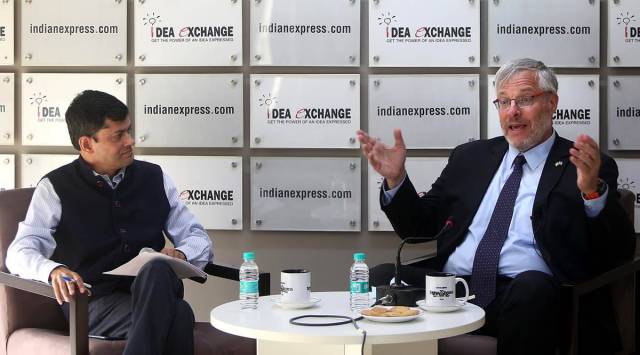A sign of deep trust: Israeli envoy on Adani’s Haifa port takeover
Last month, a consortium led by the Adani Group completed the acquisition of the port, one of the largest in the eastern Mediterranean region, for $1.2 billion.
 Addressing the media on the completion of 30 years of full diplomatic relations between India and Israel, Gilon said that with ports being the core business of Adani Group, the company could utilise the deal to boost trade in the region, including bilateral trade. (Indian Express)
Addressing the media on the completion of 30 years of full diplomatic relations between India and Israel, Gilon said that with ports being the core business of Adani Group, the company could utilise the deal to boost trade in the region, including bilateral trade. (Indian Express) Handing over a strategic asset to an Indian company was a sign of deep trust, Israel’s Ambassador to India Naor Gilon said Wednesday while referring to the Adani Group’s recent takeover of the strategically located Haifa port in his country.
Last month, a consortium led by the Adani Group completed the acquisition of the port, one of the largest in the eastern Mediterranean region, for $1.2 billion.
Addressing the media on the completion of 30 years of full diplomatic relations between India and Israel, Gilon said that with ports being the core business of Adani Group, the company could utilise the deal to boost trade in the region, including bilateral trade. He also said that the group was looking for more projects in Israel, and expressed hope that it would succeed.
The Ambassador’s remarks come at a time when the Adani Group is facing severe turbulence in the markets following the release last month of the Hindenburg Research report that accused it of “brazen stock manipulation and accounting fraud”.
The Haifa port handles a major chunk of Israel’s container cargo traffic and is the country’s principal port for passenger traffic and cruise ships. Positioned as Israel’s gateway to the rest of the world, it is one of the country’s three major international seaports. It is also the only port in Israel for tourists departing for Mediterranean cruises.
The port was being operated by Haifa Port Company, an Israeli government organisation.
Responding to questions on joint ventures of Adani group with Israeli firms, in the backdrop of allegations by Congress leader Rahul Gandhi of favouritism, the envoy said Israeli private companies have around 80 joint ventures with Indian firms such as Tata, Kalyani and BEL, and not just one. “To focus on one company (Adani Group)… I do not see an issue here. Joint ventures are not signed or pushed by Israel,” he said, adding that Israeli private companies were opting for joint ventures to be relevant in the Indian market and they were looking for stable manufacturing partners.
Talking about growing defence ties between Israel and India, Gilon said the two countries had “wonderful” cooperation in the past and there would be many more defence projects in the future. “The direction is positive. We had a strong past and a stronger future,” he said. He said government-to-government discussions on defence cooperation had always taken place and that it was a topic high on the agenda.
Talking about the challenges around Make in India from Israel’s point of view, particularly in the defence sector, he said in the perfect world, Israel would not sell any of the defence systems it is developing as that could risk exposing its capabilities and vulnerabilities to another country. But it does so, he said, since Israel’s expenses on defence are huge.
He said when a system is exported, one is already vulnerable to reverse engineering tactics. “But here (under Make in India), you are giving your IP and knowledge. You can only do it with countries you trust with your life, that is the bottom line. That is the sensitivity,” he said, adding that the capacity to manufacture is a value addition for export to other destinations as Israel’s manufacturing capacity is limited.
He added that with the Russia-Ukraine war and concerns over China, there has been a rise in defence procurement in the world.
Gilon also said Israel and India were working closely in the sphere of counter terrorism. Talking about NSO Group, which developed the controversial Pegasus spyware, he said it was a technology developed in Israel primarily to counter terrorism and organised crime.
He said that though a private company developed it, the spyware had strong export controls.
According to Gilon, India and Israel are looking to finalise the proposed free trade pact which is expected to further boost overall bilateral trade ties and indicated the possibility of a forward movement on it soon.



- 01
- 02
- 03
- 04
- 05




























